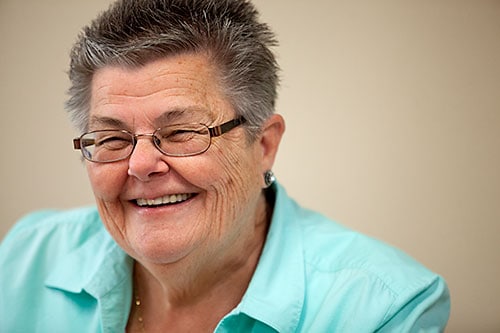Sister Terry Dodge really thinks being Grand Marshall is a big deal

Sister Terry Dodge will not be doing a royal wave at the upcoming Fourth of July parade.
The executive director of Crossroads, a Claremont-based nonprofit that helps formerly incarcerated women, is so excited to be the grand marshal that she’s planning to wave enthusiastically to the crowd as she makes her way down Indian Hill Boulevard next Wednesday.
When asked how she reacted to the news that she would become grand marshal, Sister Terry said she thought of her parents.
“When we were kids, we grew up in Lakewood about 40 miles from here, and every year there was the Pan-American parade, and going to that as a family was always a big deal,” she said. “So it’s a lot of fun.”
Sister Terry has been leading Crossroads since 1989, and during that time has helped hundreds of formerly incarcerated women get back on the
Sister Terry became involved with Crossroads after working with her brother, who at the time was in and out of jail and was frustrated with the post-release system. It inspired her to leave her previous career in education.
“Everybody looked at history, what people had done rather than what they hoped to do, how they wanted to make change,” she said.
Crossroads has had enormous success in helping women re-enter society. Workers and volunteers at the shelter teach women how to handle money, how to score a job interview and keep that job, how to multi-task in a modern world, and sometimes even how to read and write.
“What we do is we journey with the woman every step of the way,” Sister Terry said. “We don’t do for her what she’s capable of doing for herself, but we don’t assume she knows how to do everything.”
Volunteers who work with the nonprofit include art teachers and cooks who teach important life and social skills.
“To listen to the conversation that goes on, it’s just two women having a normal conversation,” Sister Terry said. “And that’s so very important.”
The work is an effort to reduce the culture shock of being released from prison into a different world. For some women, especially those who have been paroled after being given a life sentence, it could be difficult to near impossible to find their footing.
All of this happens within six months’ time. Despite the seemingly limited time frame, up to 95 percent of women who enter Crossroads have not returned to prison.
Sister Terry has a lot of success stories of women who were helped by the Crossroads program. There’s Lou, who was released from prison when she was 88 after serving 24 years. Crossroads helped her get her social security card and her SSI before she settled down with her sister in Michigan.
There’s Pauline, who had a lot of fears and medical issues and seemed destined to fail, who burst into Sister Terry’s office one day and said, “Sister Terry, I’m not afraid anymore.”
There’s one woman who was picked up by Sister Terry once she was discharged from California Institute for Women in Chino who entered the program not knowing how to cook and left with an expert command of a turkey dinner. For Sister Terry, the beginning of that path to success is simple.
“To me, the most important success is that everyone who comes, knows she is loved, knows that we care about her,” Sister Terry said. “It’s not about her history, it’s about her future.”
Of the roughly 13 people who work at Crossroads, more than half are formerly incarcerated women who have been helped by the program, Sister Terry said. The nonprofit operates on a shoestring budget, and funding is always an issue, but it’s enough to do the work.
“We’re not here for the money obviously, we’re here for the mission,” she said.
One of those employees is Jackie, a former participant in the program who went on to get her bachelor’s degree in sociology and now works as Crossroads’ program director.
While the majority of Claremonters support Crossroads today, the group has had its ups and downs since opening in 1974. Sister Terry remembers trying to buy a home on 12th Street in 2009 and being met with opposition from the neighbors. It got ugly, she said, and she withdrew plans to buy the house.
“I said, ‘Why would I buy in a place where we’re not welcome, where the women I love would not be welcome?’” she said. “There’s no way I would buy this house.”
When word of the incident spread, Sister Terry said people would come up to her around town to offer support.
“There’s people in Claremont that do not want us around, and that’s okay,” she said. “But the majority of Claremont welcomes the women that I work with. And that’s what’s so wonderful.”
In the end, the overall goal for Crossroads is not only bringing incarcerated women back into the community, but pushing to change the narrative from looking at someone’s past into looking at someone’s potential.
“If we want to change society, we have to look at people differently; we can’t keep talking about us and them,” she said. “There has got to be a we.”
Ultimately, Sister Terry says, part of that change is to create a better system that focuses on bringing recently paroled people back into the community, and that takes strength in numbers.
“I love what I’m doing, but the work I do is not amazing, it’s amazing because not enough people are doing it,” she said.
—Matthew Bramlett
news@claremont-courier.com










0 Comments